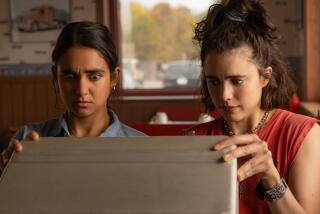MOVIE REVIEW : ‘RATBOY’ SWIMS AGAINST MAINSTREAM
- Share via
Sondra Locke’s “Ratboy” (at the Beverly Center Cineplex) is a fairy tale with a cutting edge.
Its protagonist, Eugene--a deformed little creature, with a rat’s face--is a rodent Candide, Pinocchio with a tail. Through his eyes, we get satirical glimpses of the American Dream, ‘80s Style: slick empty hopes out of Robin Leach-Land. And Locke tells this charming story swiftly, with a delicate, breezy touch. Making her directorial debut--ably supported by Clint Eastwood’s technical team, a good script and cast--she gets something really unusual: Grimm Brothers-style, mixing wonder with rough edges, undertones of pain beneath the fantasy.
The story is a fable about beauty and ugliness, success, love and exploitation. Ratboy Eugene, discovered in his garbage dump home, drops into the hands of an L.A. dynamo named Nikki Morrison (Locke) and her brothers. But Nikki’s clumsy attempts to turn Eugene into a media sensation boomerang. He falls in love with her, makes a shambles of a press conference after she stands him up and then flees Los Angeles in a stolen car with his street-smart chauffeur, Manny (Robert Townsend, in one of the movie’s best performances.)
The movie, released cautiously here, was a critical sensation months ago in France, where it was compared favorably--and sometimes preferred--to both “E.T.” and “The Elephant Man.” If these claims seem extravagant, it’s only because “Ratboy” is such a modest film: unassuming, gentle, likable, made with few pretensions. American audiences may respond differently--but only because Locke and screenwriter Rob Thompson (“Hearts of the West”) chose deliberately to swim against the current movie mainstream.
The movie mocks our obsessions with both physical beauty and fame. Thompson carefully chooses a repulsive image for his hero: a rat who lives in garbage. (In the hands of make-up artist Rick Baker and actress Sharon Baird, he’s an atypically cute, lively and sympathetic rat, but a rat all the same.) The story is like a version of “The Ugly Duckling” where there’s no transformation and the swans turn out to be worse than the ducks. “Ratboy” doesn’t have the usual “win-it-all” pay-off. It suggests that, in a mercenary milieu, extreme ugliness assumes a market value--perhaps because it’s the inverse of the beauty everyone craves--and, by its existence, validates that beauty.
The catch is that Ratboy, on one level, becomes like everyone else. Pulled into this National Enquirer world, he craves its ersatz beauty too, begins to despise himself--angrily trying to pluck out his whiskers at a Hollywood party. But he is unlike his exploiters, because his love is pure. He’s willing at the end to sacrifice himself for Nikki.
The film is embedded with that message many of us were told in youth--but which constant media assaults told us to forget: You can’t judge a book by its cover. Eugene becomes a beautiful character, not in the way Spielberg would have beautified him--an adorable little Beatrix Potter rat, whiskers festooned with sunny dew-pearls, a rat everyone’s mother could love--but by showing us what lies underneath: his yearning, his innocence, and finally, his Ratboy nobility in the face of overwhelming odds. There’s something simple and decent about “Ratboy” (PG-13). Its moral is natural and affecting; it resonates with that old storybook chime: “Once upon a time. . . .”
‘RATBOY’
A Warner Bros presentation of a Malpaso production. Producer Fritz Manes. Director Sondra Locke. Script Rob Thompson. Associate producers David Valdez, Thompson. Camera Bruce Surtees. Editor Joel Cox. Music Lennie Niehaus. Production design Edward Carfagno. With Locke, Sharon Baird, Robert Townsend, Christopher Hewett, Gerrit Graham, Louie Anderson.
Running time: 1 hour, 53 minutes.
MPAA rating: PG-13 (parents are strongly cautioned; some material may be inappropriate for children under 13).
More to Read
Only good movies
Get the Indie Focus newsletter, Mark Olsen's weekly guide to the world of cinema.
You may occasionally receive promotional content from the Los Angeles Times.









